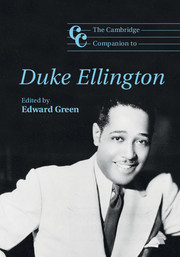Acknowledgements
There are many people I want to thank for the coming to be of this book. I am grateful first to Vicki Cooper of Cambridge University Press, its editor in charge of publications in the fields of music and drama, for her enthusiastic support. When I proposed a book of essays to her that would show why Duke Ellington was America’s most important composer, she welcomed the idea heartily. I am thankful as well to Fleur Jones, the editor at Cambridge who supervised the production of this Companion. She has been a model of good cheer and thorough professionalism. There are many others at the Press who helped see this book through to publication, and while I do not know most of their names, in behalf of all the authors of this book, I want to express our appreciation for their work.
As readers of this Companion will see, the writings in it range widely in terms of style, methodology, and jazz notation. Ellington, who wanted soloists of highly varied temperaments and musical backgrounds to join together in his band, I think would approve! After all, one of the important new things in jazz was this: composers welcoming the spontaneous, creative, musical commentary of others on their work. That, at its best, is the meaning of improvisation, and some of the very best improvisation in jazz history happened within the Ellington band. I invited the many authors of this book to participate in the same spirit – only commenting not through music, but through words with critical insight. The goal was, through their very different perspectives, to bring forth as richly as possible the meaning within Ellington’s music. I thank them all for it. There are two others I wish to mention, each of them originally slated to be a contributor to this Companion: Annie Kuebler and Michael James. Sadly, both died before they were able to submit their writings. They are, and will continue to be, greatly missed.
I am grateful to Jazz at Lincoln Center, which houses the Frank Driggs Collection, for the photos of Ellington and the band that now grace the front and back covers of this Companion. And the publishers and I particularly thank the Institute of Jazz Studies at Rutgers University for permission to reproduce our frontispiece photo. IJS archivist Tad Hershorn first drew my attention to it: a photo embodying the joy of music-making, and showing the older Ellington still possessed of the gusto and vibrancy of his youth. While every effort was made, here and elsewhere, to identify the sources of all material used in this volume, and to trace all copyright holders, it has not always been possible. If any omissions are brought to our notice, the publishers will be happy to include appropriate acknowledgements in any subsequent edition of the book.
I want to thank my dear wife, Carrie Wilson, for her warm and careful thought about this book – in fact, about all my work, both as a scholar and as a composer. She has made my expression in each field stronger, and I love her for this – and for much more. I am also deeply fortunate in having Barbara Allen and Anne Fielding as my colleagues in the teaching of music at the Aesthetic Realism Foundation. Our many lively, probing conversations about music have been an ongoing joy in my life. They also made many keen and useful suggestions about how to present Duke Ellington’s work in the clearest and most honest light. They made this book better.
The greatest thing that happened to me, as man and musician, was learning from Eli Siegel, the founder of Aesthetic Realism, that art and life explain each other. “All beauty,” he taught, “is a making one of opposites, and the making one of opposites is what we are going after in ourselves.” The first critic of music to explore the meaning of this great principle was Martha Baird, and I was privileged to be her student. I have also had the inestimable honor of studying with Ellen Reiss, poet, critic, and Chairman of Education at the Aesthetic Realism Foundation. To say all the ways her teaching has deepened my capacity to be an honest critic of music and a true scholar would take me far beyond the confines of an Acknowledgements page.
I conclude with this: as a young musician, I was oriented strongly toward the classical European tradition. I liked jazz greatly, but – to be honest – did not think it had the same size of meaning, emotional heft, that I loved in Bach, Beethoven, Prokofiev. Among other great things Eli Siegel did for me was to open up my mind and heart to welcome beauty wherever it happened. He was the first critic to say, clearly, and decades ago, that Duke Ellington is the greatest composer of America. He inspired me to test that statement: to dig into the music, and report sincerely on what I heard.
That was many years ago. It was the early 1970s. This book is a result, and I am glad to say, I think in the writing within it, in all the chapters in their own ways, Ellington’s greatness shines through.

